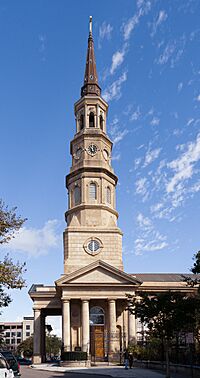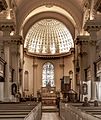St. Philip's Church (Charleston, South Carolina) facts for kids
|
St. Philip's Church
|
|
|
U.S. National Historic Landmark District
Contributing Property |
|

St. Philip's Church
|
|
| Location | 142 Church Street, Charleston, South Carolina |
|---|---|
| Built | 1835-1836, building; steeple, 1848-1850 |
| Architect | Joseph Hyde, building; Edward Brickell White, steeple |
| Part of | Charleston Historic District (ID66000964) |
| NRHP reference No. | 73001695 |
Quick facts for kids Significant dates |
|
| Added to NRHP | November 7, 1973 |
| Designated NHL | November 7, 1973 |
| Designated NHLDCP | October 9, 1960 |
St. Philip's Church is a very old and important church located at 142 Church Street in Charleston, South Carolina. It used to be an Episcopal church, but now it is part of the Anglican Diocese of South Carolina.
The church building was finished in 1836, and its tall steeple was added later, between 1848 and 1850. It is known for its impressive tower, which looks like designs by famous architects Christopher Wren and James Gibbs. The church also has three grand entrances with columns, making it a beautiful and sophisticated building. Because of its historical importance and design, St. Philip's Church was added to the National Register of Historic Places and named a National Historic Landmark on November 7, 1973.
Contents
A Look at St. Philip's Church History
South Carolina's Oldest Church Community
St. Philip's Church was started in 1680, making it the oldest European-American religious group in South Carolina. The very first St. Philip's Church was a wooden building built between 1680 and 1681. It was located where St. Michael's Episcopal Church stands today.
Building the Church Through the Years
In 1710, a big storm damaged the first wooden church. So, a new St. Philip's Church was started a few blocks away on Church Street. This second church was completed in 1723. Sadly, it burned down completely in 1835. The church building you see today was started in the same year, 1835, and finished in 1836. The tall steeple, which is a famous part of the church, was added later, between 1848 and 1850.
Important People in the Church's Past
Many important people have been connected to St. Philip's Church throughout its history.
- One early leader was Rev. Thomas Frost, who became the church's rector (main minister) in 1785. He helped guide the church after the American Revolutionary War.
- His son, Rev. Thomas Downes Frost, also served as an assistant minister at St. Philip's.
- Henrietta Johnston, the wife of another early rector, became the first recorded female artist in the American colonies.
- Mary Roberts, who was the first female American artist known for painting tiny portraits called miniatures, was also connected to the church and buried there in 1761.
The Church as a Lighthouse
For many years, the tall tower of St. Philip's Church had a special job. It served as a lighthouse! From 1893 to 1915, a light in the tower helped guide ships safely into Charleston's harbor. It worked with another light located on Fort Sumter to show sailors the right path. The light was even used again temporarily in 1921 when the regular lighthouse needed repairs.
Recent Church Decisions
In recent years, there was a disagreement about who owned the church building. The Anglican Diocese of South Carolina and the Episcopal Diocese both believed they had the right to the property. On August 17, 2022, the South Carolina Supreme Court made a decision. The court said that St. Philip's Church, along with five other churches, could keep their properties. This meant the Anglican Diocese of South Carolina would continue to own the church building.
Notable Burials
Many important historical figures are buried in the graveyard of St. Philip's Church. Here are a few:
- John C. Calhoun: He was the seventh Vice-President of the United States.
- Christopher Gadsden: He was one of the people who signed the Continental Association, an important agreement during the American Revolution.
- Charles Pinckney: He was a US Senator, a Governor of South Carolina, and one of the people who signed the United States Constitution.
- Edward Rutledge: He was a member of the Continental Congress and one of the people who signed the United States Declaration of Independence.
Images for kids
See also








